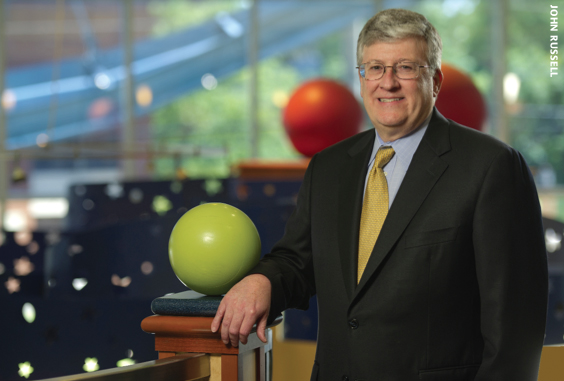Luke Gregory
Luke Gregory, M.A, MHA, MBA
CEO, Monroe Carell Jr. Children’s Hospital at Vanderbilt
What are the major changes you think will come to Vanderbilt and the Medical Center over the next 10 years?
Over the next decade, we will begin to understand how health reform will affect health care policy, our institution and the development of health care systems. That will include understanding not only the financial implications, but also the impact on patient access to care as well as the bearing on employers.
In addition, personalized medicine will continue to be at the forefront of delivering quality, individualized care to patients to maximize health outcomes. We see more and more research in science becoming applicable to the daily care of children and adults as breakthroughs are translated from the bench to the bedside.
Where do you see the seeds of those changes now?
As a world-leading research institution, our scientists are working diligently to uncover breakthroughs in medicine, particularly in the area of personalized care, that will have far reaching implications around the world. Their endeavors are bolstered by support from the National Institutes of Health, receiving grants that recognize the merits of their basic and clinical research. We will continue to recruit the best and brightest to our University and Medical Center.
What is happening now at Vanderbilt that has a chance to have impact all over the world?
We are changing the landscape of how providers care for their patients with the “My Cancer Genome,” developed by Mia Levy, M.D., Ph.D., assistant professor of Biomedical Informatics and Medicine and Cancer Clinical Informatics Officer, and William Pao, M.D., Ph.D., director of the Division of Hematology and Oncology and director of Personalized Cancer Medicine. This database tool puts us on the cutting-edge of personalized medicine, connecting physicians, caregivers, patients and research with the latest developments in cancer research and therapies. It will transform cancer treatment as we know it.
Our international program also allows us to extend our research and commitment to care for all children on a global level. In partnership with The Shalom Foundation, we are working to improve children’s lives in Guatemala through better health. Together, we recently opened a clinic there that enables us to create sustainable programs and to educate the community on how to better care for themselves.
What are the biggest obstacles or challenges Vanderbilt and the Medical Center will face in the next 10 years?
Primarily for the Medical Center, the challenge will be how to best transition care for the aging population, while figuring out how to accommodate chronic conditions and develop various protocols and pathways in Geriatrics.
For children, we will need to engage with public health agencies, and determine as state funding is challenged how Children’s Hospital contributes to health prevention and health promotion. I imagine we will be called on more often to provide those services.
What are your hopes for Vanderbilt and the Medical Center in the next 10 years?
My hope is that we continue to maintain outstanding quality of care to serve all patients and to continue to recruit the outstanding faculty and staff who deliver that unparalleled care every day. I also would hope our growth is ongoing and that we are able to expand beyond the 21st Avenue campus.
With another phase of growth, what do you envision for the next 10 years at Children’s Hospital?
As we continue to grow, we must consider how we create and evolve a distributed network of services across Tennessee with multi-specialty clinics. Expansion will come by way of developing more specialty clinics, requiring that we continue to foster our communications and partnerships with community physicians.

Leave a Response